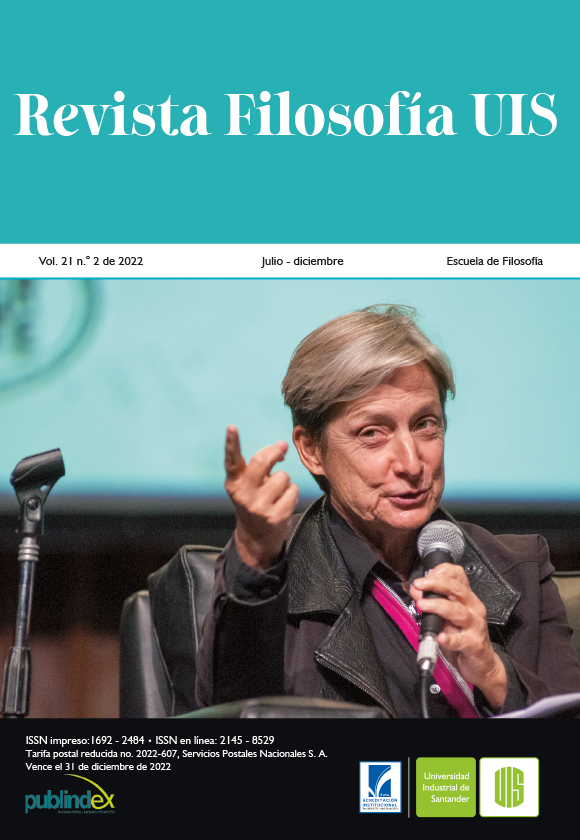Approach to Constitutivism: Objective and Structure of the Constitutivist Foundation of Moral Norms
Published 2022-07-01
Keywords
- Constitutivism,
- constitutivist principles,
- agency,
- action,
- constructivism
- moral norms ...More
How to Cite
Copyright (c) 2022 Revista Filosofía UIS

This work is licensed under a Creative Commons Attribution 4.0 International License.
Abstract
This work seeks to reconstruct the structure of constitutivism to facilitate its dissemination in the Spanish language. To achieve this, it starts from an analysis of the formulation of the general objective of the constitutivist strategy. Then, it traces its historical origins in the problems of the sources of normativity, constructivism, and the normativity of reasons. Later, there is an explanation about the simple constitutivist movement and, finally, the article closes by presenting the three main theses that support any constitutivist strategy.
Downloads
References
- Bagnoli, C. (2011). Constructivism in Metaethics. En E. Zalta (Ed.), Stanford Encyclopedia of Philosophy. https://plato.stanford.edu/archives/spr2021/entries/constructivism-metaethics
- Bratu, C. & Dittmeyer, M. (2016). Constitutivism About Practical Principles: Its Claims, Goals, Task and Failure. Philosophia, 44, 1129-1143. https://doi.org/10.1007/s11406-016-9748-1
- Enoch, D. (2009). Can there be a global, interesting, coherent constructivism about practical reason? Philosophical Explorations, 12(3), 319-339. https://doi.org/10.1080/13869790903067683
- Enoch, D. (2011). Shmagency revisited. En M. Brady (Ed.), New Waves in Metaethics (pp. 208-233). Palgrave-Macmillan.
- Ferrero, L. (2009). Constitutivism and the Inescapability of Agency. Oxford Studies in Metaethics, 4, 303-333. https://philarchive.org/archive/FERCATv1
- Ferrero, L. (2018). Inescapability Revisited. Manuscrito: Revista Internacional de Filosofía, 41(4), 113-158. https://doi.org/10.1590/0100-6045.2018.v41n4.lf
- Ferrero, L. (2019). The Simple Constitutivist Move. Philosophical Explorations, 22(2), 146-162. https://doi.org/10.1080/13869795.2019.1599048
- Forst, R. (2002). Contexts of justice. Political philosophy beyond liberalism and communitarianism. University of California Press.
- Katsafanas, P. (2011). Deriving Ethics from Action: A Nietzschean Version of Constitutivism. Philosophy and Phenomenological Research, 83(3), 620-660. https://doi.org/10.1111/j.1933-1592.2010.00440.x
- Katsafanas, P. (2013). Agency and the Foundations of Ethics: Nietzschean Constitutivism. Oxford University Press UK.
- Katsafanas, P. (2018). Constitutivism about Practical Reasons. En D. Star (Ed.), Oxford Handbook of Reasons and Normativity (pp. 367-394). Oxford University Press.
- Katsafanas, P. (2019). Constitutivism. En I. Thomson & K. Becker (Eds.), The Cambridge History of Philosophy, 1945-2015. Cambridge University Press.
- Korsgaard, C. (1989). Personal Identity and the Unity of Agency: A Kantian Response to Parfit. Philosophy and Public Affairs, 18(2), 101-132.
- Korsgaard, C. (2000). Las fuentes de la normatividad. UNAM.
- Korsgaard, C. (2009). Self-constitution: Agency, Identity and Integrity. Oxford University Press.
- Korsgaard, C. (2011). Self-Constitution and Irony. En J. Lear (Ed.), A Case for Irony (pp. 75-83). Harvard University Press. https://dash.harvard.edu/handle/1/33946920
- Korsgaard, C. (2014). The Normative Constitution of Agency. En M. Vargas y G. Yaffe (Eds.), Rational and Social Agency: The Philosophy of Michael Bratman (pp. 190-214). Oxford University Press. https://dash.harvard.edu/handle/1/34257938
- Mackie, J. L. (1990). Ethics. Inventig right and wrong. Penguin.
- Rawls, J. (1980). Kantian Constructivism in Moral Theory. Journal of Philosophy, 77(9), 515-572. https://doi.org/10.2307/2025790
- Street, S. (2010). What is Constructivism in Ethics and Metaethics?. Philosophy Compass, 5(5), 363-384. https://doi.org/10.1111/j.1747-9991.2009.00280.x
- Tiffany, E. (2012). Why Be an Agent? Australasian Journal of Philosophy, 90(2), 223-233.
- Tugendhat, E. (1997). Lecciones de ética. Gedisa.
- Velleman, J. D. (1992). What Happens When Someone Acts? Mind, 101(403), 461-481. https://www.jstor.org/stable/2253898
- Velleman, J. D. (1996). The Possibility of Practical Reason. Ethics, 106(4), 694-726. https://www.jstor.org/stable/2382031
- Velleman, J. D. (2009). How we get along? Cambridge University Press.
- Velleman, J. D. (2013). Foundations for moral relativism. Cambridge University Press.
- Williams, B. (1982). Moral Luck. Cambridge University Press.

